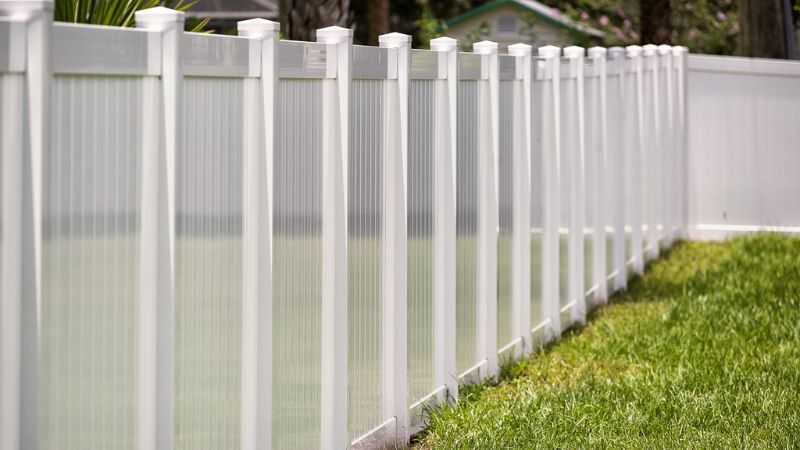Maintaining vinyl fencing is imperative to guarantee its longevity and aesthetic appeal. Vinyl fences are popular due to their low maintenance requirements compared to wood or metal fences. However, they still need proper care to keep them pristine and extend their lifespan. Regular upkeep can prevent common issues such as discoloration, damage, and wear. By following some best practices, you can ensure that your vinyl fence remains a durable and attractive part of your property.
8 Best Practices For Maintaining Vinyl Fencing
1. Regular Cleaning
Regular cleaning is one of the most effective ways to maintain your vinyl fence. Dust, dirt, and grime can accumulate over time, making the fence look dull and less attractive. To clean your vinyl fence, use a mild detergent mixed with water. Apply the solution using a soft-bristled brush or a sponge to avoid scratching the surface. Gently scrub the fence and rinse thoroughly with water. For more stubborn stains, you might need a specialized vinyl cleaner. Avoid using abrasive cleaners or high-pressure washers, as they can damage the fence.
2. Inspect for Damage
Routine inspections are essential to identify any damage early. Check your vinyl fence regularly for signs of cracks, chips, or other forms of damage. Inspect the posts, rails, and panels for any defective fittings or structural issues. Preventing additional damage and expensive repairs is possible by promptly addressing these issues. If you notice any significant damage, such as large cracks or broken sections, consider contacting a professional to assess and repair the fence.
3. Trim Vegetation
Overgrown vegetation can cause significant damage to your vinyl fence. Plants, vines, and shrubs that come into contact with the fence can scratch or stain it. Furthermore, mold or mildew growth may result from the moisture emitted by overhanging plants. Regularly trim back any vegetation near the fence to prevent these issues. Keeping plants away from the fence makes cleaning and maintaining easier.
4. Remove Mold and Mildew
Mold and mildew can develop on vinyl fences, especially in damp or shaded areas. To remove mold and mildew, mix equal parts water and white vinegar or use a commercial mold remover. Apply the solution to the affected areas and scrub with a brush to remove the growth. Clean the fence well with water and let it dry all the way through. Regularly check for mold and mildew, particularly in areas with poor drainage or limited sunlight.
5. Avoid Harsh Chemicals
Using strong chemicals on your vinyl fence can damage it and change its color. Stick to mild detergents and avoid using bleach or other strong chemicals. If you need to use a cleaning solution, always test it on a small, inconspicuous area first to ensure it does not harm the vinyl. Using the right cleaning products will help maintain the appearance and integrity of your fence.
6. Repair Minor Damage Promptly
Minor damage, such as small cracks or chips, should be repaired immediately. For minor cracks, use a vinyl repair kit, which typically includes a filler and a touch-up paint. Follow the manufacturer’s instructions for application. For more extensive damage, consult a professional. Prompt repair of minor issues can prevent them from worsening and extend the life of your fence.
7. Ensure Proper Drainage
Proper drainage is important to prevent water from pooling around your vinyl fence. Standing water can grow mold, and excessive moisture can weaken the fence over time. Make sure that the area around your fence is properly graded to allow water to drain away. Consider installing drainage solutions or adjusting the landscaping to improve water flow if you notice water pooling.
8. Maintain the Fence Structure
Ensure that the structural components of your vinyl fence are well-maintained. Check the posts, rails, and brackets for stability and secure connections. Fix or replace any parts that aren’t tight enough or are broken. A well-maintained structure helps prevent sagging and ensures the overall integrity of the fence.
Conclusion
Maintaining vinyl fencing involves regular cleaning, inspection, and prompt damage repair. With these tips, you can ensure that your fence looks great and works well for many years. Regular care helps prevent common issues and extends the lifespan of your fence, ensuring that it remains a valuable and attractive feature of your property. With minimal effort, you can preserve your vinyl fence’s beauty and durability and enjoy its long-term benefits.
FAQs
How often should I clean my vinyl fence?
It is recommended to clean your vinyl fence at least once a year. However, if you live in an area with high dust, pollen, or pollutants, you may need to clean it more frequently. Regular cleaning helps prevent dirt and grime buildup and keeps the fence looking its best.
Can I use a power washer to clean my vinyl fence?
While a power washer can be effective, it is not always recommended for vinyl fences. High pressure can cause damage or create water leaks in the fence’s structure. It is safer to use a mild detergent and a soft brush or sponge for cleaning.
